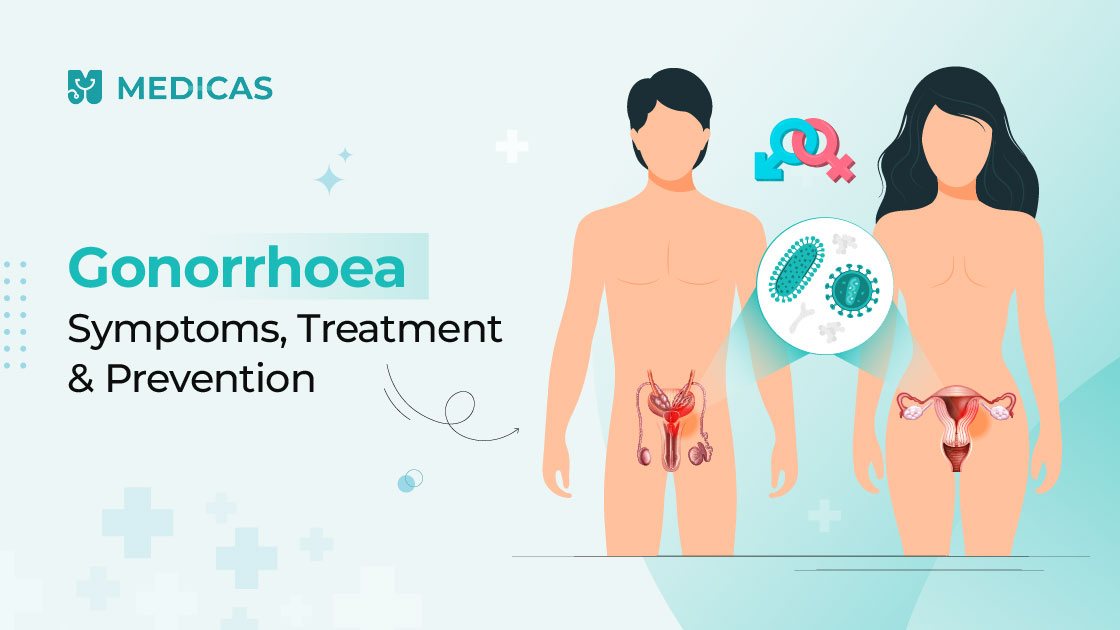Gonorrhea is a common sexually transmitted infection (STI) that affects millions worldwide, including a significant number in India, where stigma often delays care. With an estimated 1-2% of sexually active adults in urban India affected, according to health surveys, understanding gonorrhea is crucial for early action. This guide explores gonorrhea symptoms, gonorrhea treatment, and gonorrhea prevention, offering practical insights into what causes gonorrhea and is gonorrhea curable. Whether you’re concerned about symptoms of gonorrhea in women, gonorrhea in men, or how long gonorrhea lasts after treatment, I’m here to provide clear guidance.
What is Gonorrhea?
Gonorrhea is a bacterial infection caused by Neisseria gonorrhoeae, primarily spread through sexual contact. It can affect the genitals, rectum, throat, and eyes, often requiring prompt gonorrhea treatment to prevent complications. In India, where cultural silence around STIs is common, awareness of what causes gonorrhea is key to addressing gonorrhea symptoms early.
How Does Gonorrhea Spread?
Gonorrhea spreads through vaginal, anal, or oral sex with an infected person. It can also pass from mother to baby during childbirth, potentially causing eye infections. Understanding transmission is vital for gonorrhea prevention and answering how do you know if you have gonorrhea.
Risk Factors for Gonorrhea Infection
Risk factors include unprotected sex, multiple sexual partners, or a history of STIs. Young adults, particularly those aged 15-24, are at higher risk, making gonorrhea prevention strategies like regular screenings essential, especially for gonorrhea in men and women.
Is Gonorrhea Contagious?
Yes, gonorrhea is highly contagious, even in asymptomatic cases. This underscores the importance of gonorrhea treatment and how to prevent gonorrhea through safe sex practices and partner notification.
Common Symptoms of Gonorrhea
Gonorrhea symptoms vary by gender and site of infection, but up to 50% of cases, especially in women, may be asymptomatic. Recognizing gonorrhea symptoms in males and females is critical for early gonorrhea treatment.
Gonorrhea in Men: Symptoms to Watch For
Gonorrhea in men often presents with:
- White, yellow, or green penile discharge.
- Burning or pain during urination.
- Testicular pain or swelling.
- Rectal discomfort if anal infection occurs. These gonorrhea symptoms signal the need for immediate testing.
Gonorrhea in Women: Key Signs
Symptoms of gonorrhea in women include:
- Unusual vaginal discharge, often yellow or green.
- Painful urination or pelvic pain.
- Bleeding between periods.
- Pain during intercourse. Women may dismiss these as minor, but they require attention for gonorrhea treatment.
Gonorrhea in the Throat or Rectum
Throat infections from oral sex may cause a sore throat, while rectal infections can lead to discharge, itching, or pain. These less common gonorrhea symptoms highlight the need for comprehensive gonorrhea prevention.
Diagnosis: How Gonorrhea is Tested
Diagnosing gonorrhea is straightforward but requires testing to confirm how do you know if you have gonorrhea. Early diagnosis supports effective gonorrhea treatment.
Home Test Kits vs Lab Testing
Lab tests, like urine samples or swabs from the genital, throat, or rectum, are highly accurate and available through lab testing services. Home test kits offer privacy but may need lab confirmation for gonorrhea diagnosis.
Can You Be Asymptomatic?
Yes, many individuals, particularly women, have no gonorrhea symptoms yet can still spread the infection. Regular screenings are crucial for gonorrhea prevention, especially for those at risk of gonorrhea in men or women.
Gonorrhea Treatment Options
Is gonorrhea curable? Yes, with proper gonorrhea treatment, most cases resolve fully. However, timely intervention is essential to avoid complications.
Recommended Antibiotics for Gonorrhea
What antibiotic treats gonorrhea? A combination of ceftriaxone (injection) and azithromycin (oral) is standard, as recommended by WHO. Completing the full course ensures how long does gonorrhea last after treatment is minimized, typically clearing within days.
Drug-Resistant Gonorrhea: What You Need to Know
Antibiotic-resistant gonorrhea is a growing concern, particularly in India, where misuse of antibiotics is common. This makes adherence to prescribed gonorrhea treatment critical and highlights the need for follow-up testing.
What Happens if Gonorrhea Goes Untreated?
Untreated gonorrhea can lead to pelvic inflammatory disease (PID) in women, infertility, or epididymitis in men. In rare cases, it can spread to joints or blood, emphasizing the urgency of gonorrhea treatment.
Preventing Gonorrhea: Best Practices
Gonorrhea prevention is the best defence against infection. Simple habits can significantly reduce your risk of contracting gonorrhea.
Safe Sex & Regular Screenings
Using condoms consistently and correctly is key to how to prevent gonorrhea. Annual STI screenings, especially for those with multiple partners, support early detection and gonorrhea prevention. Book a lab test for proactive care.
Can Gonorrhea Come Back After Treatment?
Yes, reinfection is possible if exposed again, as gonorrhea treatment doesn’t confer immunity. Partner treatment and safe sex are vital to prevent the recurrence of gonorrhea symptoms in males and females.
Gonorrhea vs. Chlamydia: What’s the Difference?
Gonorrhea and chlamydia share similar symptoms but are caused by different bacteria (Neisseria gonorrhoeae vs. Chlamydia trachomatis). Both require specific gonorrhea treatment or chlamydia treatment, and co-infections are common, necessitating comprehensive testing.
Myths and Misconceptions About Gonorrhea
Misconceptions about gonorrhea fuel stigma and delay care. Let’s debunk common myths to empower you with facts about
| Myth | Fact |
| Gonorrhea only affects “promiscuous” people. | Anyone sexually active can contract gonorrhea, regardless of lifestyle, making gonorrhea prevention universal. |
| Gonorrhea always has obvious symptoms. | Asymptomatic cases are common, especially in women, making regular screenings essential. |
| Gonorrhea can be caught from toilet seats. | Gonorrhea is spread through sexual contact, not casual contact like toilet seats. |
| Gonorrhea is not curable. | Gonorrhea is curable with the right antibiotic treatment, although drug resistance is a growing concern. |
| Home remedies can cure gonorrhea. | Only prescribed antibiotics can treat gonorrhea effectively; home remedies are not reliable. |
| Once treated, you’re immune to gonorrhea. | Reinfection is possible, so continued prevention and protection are important. |
| Gonorrhea only affects the genitals. | Gonorrhea can also infect the throat and rectum, requiring comprehensive testing. |
These truths encourage proactive gonorrhea treatment and care.
Living with Gonorrhea: Lifestyle & Relationships
Managing gonorrhea involves more than medical treatment—it impacts relationships and self-care. Open communication with partners about gonorrhea treatment and gonorrhea prevention fosters trust. Abstaining from sex during treatment prevents spread, and addressing emotional health supports gonorrhea in men and women.
When Should You See a Doctor?
If you suspect gonorrhea symptoms, have a new sexual partner, or are at risk, see a doctor promptly. Early action prevents complications from what happens if gonorrhea is untreated.
How to Book an Online Consultation for Gonorrhea
An online doctor consultation offers private, convenient support for gonorrhea symptoms or testing concerns. You can book an appointment with experts from across the country via Medicas. If you are a woman and would like to consult female gonorrhea specialists, you can do that here.
Conclusion
Gonorrhea may feel overwhelming, but it’s a treatable condition that doesn’t have to dictate your health. By understanding gonorrhea symptoms, embracing gonorrhea treatment, and practicing how to prevent gonorrhea, you can move forward with hope. Whether you’re addressing symptoms of gonorrhea in women, gonorrhea in men, or how long does gonorrhea last after treatment, resources like lab tests and online doctor consultations make care accessible. In a world where stigma can silence, your courage to seek help is powerful—let’s break the barriers together and prioritize your well-being.
Frequently Asked Questions
- What are the first signs of gonorrhea? The first gonorrhea symptoms include painful urination, unusual discharge (penile or vaginal), or pelvic pain, though many cases are asymptomatic, especially in symptoms of gonorrhea in women.
- Can gonorrhea be treated without going to a clinic? Yes, gonorrhea treatment with antibiotics can be prescribed via online doctor consultations, but testing and follow-up are essential to ensure is gonorrhea curable.
- How do I book an online doctor appointment for STDs? Visit online doctor consultation to schedule a private session for gonorrhea concerns or gonorrhea symptoms in males and females.
- Is it safe to consult a doctor online for gonorrhea symptoms? Yes, online doctor consultations are safe and confidential for discussing gonorrhea or arranging gonorrhea treatment and testing.
Disclaimer
Medical Advice: The information provided in this blog post is for educational purposes only and should not be considered as a substitute for professional medical advice, diagnosis, or treatment. Always consult with a qualified healthcare professional for personalized guidance regarding your specific medical condition.
Accuracy of Information: While we strive to provide accurate and up-to-date information, the field of medicine and viral fevers is constantly evolving. The content in this blog post may not reflect the most current research or medical guidelines. Therefore, it is advisable to cross-check any information provided with reliable sources or consult a healthcare professional.
Individual Variations: The symptoms, causes, treatment options, and preventive measures discussed in this blog post are general in nature and may not apply to everyone. It is important to remember that each individual’s situation is unique, and personalized medical advice should be sought when making healthcare decisions.
External Links: This blog post may contain links to external websites or resources for additional information. However, we do not endorse or have control over the content of these third-party websites. Accessing these links is done at your own risk, and we are not responsible for any consequences or damages that may arise from visiting these external sources.
Results May Vary: The effectiveness of treatment options or preventive measures mentioned in this blog post may vary from person to person. What works for one individual may not work the same way for another. It is essential to consult with a healthcare professional for personalized advice tailored to your specific needs.



